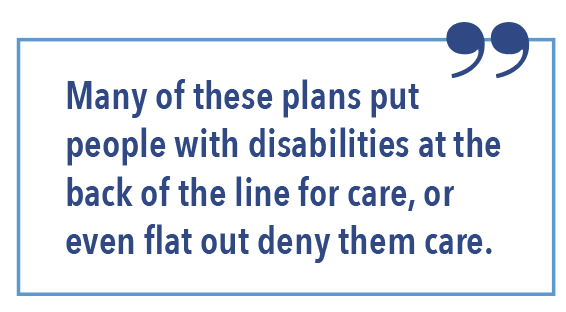Over the last few months, we’ve seen the devastating impact of COVID-19 on people with disabilities, who are struggling to get the home and community-based services (HCBS) they need to stay safe in their own homes and face a high risk of infection and death in institutions and other congregate settings.
We’ve seen discrimination in accessing care, a problem amplified for Black people with disabilities who have the highest rates of infection and hospitalization. And the recent police violence has laid bare the institutional racism that underlies the healthcare and criminal justice systems. The disability community is fighting tirelessly to get these disparities addressed and below, we detail some of that work.
COVID-19 Response
Congressional Response:
The COVID-19 crisis led to a furry of Congressional activity in March that we summarized in our last column. While the three bills passed by Congress have provided some relief, the disability community’s most urgent priorities – particularly dedicated funding for the HCBS on which people with disabilities rely – were not included.
- On May 15, the House passed a fourth relief package, the HEROES Act (HR 6800), that includes dedicated funding for HCBS, among other still-unaddressed priorities. The Senate has not yet taken up the bill for consideration; however, when the Senate does act, it is expected it will pass a much smaller bill than the one that passed in the House, meaning we will need your help to make sure the needs of the disability community are included in the final bill.In addition to COVID-19 relief, Congress has just begun considering bills in response to calls for police reform across the country. An estimated one-third to one-half of people killed by police are people with disabilities, making the intersection of race and disability critical to these conversations. We will keep you updated as reforms move forward.
Federal Agency Response:
In March, Congress allocated $175 billion to a provider relief fund being distributed by the Department of Health and Human Services (HHS). HHS has distributed significant sums to Medicare and hospital providers, but none yet to any Medicaid HCBS providers. Due to a huge push from disability advocates and members of Congress, HHS announced on June 9 that it would be distributing $15 billion to Medicaid providers. While this funding is desperately needed, it is not a replacement for the dedicated HCBS funding in the HEROES Act, which will among other things help prevent cuts to HCBS as states (like Georgia) are reducing their state budgets.
With the attention on high infection rates and deaths in nursing homes, the Centers for Medicare and Medicaid Services (CMS) recently announced several nursing home initiatives. These have included requirements to report infections to residents and their families and share data with the Centers for Disease Control and Prevention (CDC), as well as the formation of a nursing With the attention on high infection rates and deaths in nursing homes, the Centers for Medicare and Medicaid Services (CMS) recently announced several nursing home initiatives. These have included requirements to report infections to residents and their families and share data with the Centers for Disease Control and Prevention (CDC), as well as the formation of a nursing home commission to make recommendations about reforms. Disability advocates, however, have been pushing CMS to expand its initiatives to cover all people in institutional and congregate care settings, who are facing the same risks as people in nursing homes. In addition, we have urged CMS to expand initiatives to include strategies to divert unnecessary admissions and to transition people back to the community. We’ll keep you updated as these initiatives move forward.
Medical Rationing:
In our last column, we discussed the increasing concern of the disability community about discrimination against people with disabilities in access to care during the coronavirus pandemic and guidance issued by HHS’ Office of Civil Rights (OCR) in response. Since then, there has been an increased focus on the Crisis Standards of Care that many states and hospitals are relying on during the pandemic to make decisions about how to allocate scarce medical resources like ventilators. Many of these plans put people with disabilities at the back of the line for care, or even fat out deny them care. CPR and partners have fled a number of complaints with OCR challenging states’ discriminatory crisis standards of care, three of which have already been resolved and led to policy changes. In addition, CPR and partners developed an evaluation framework to assist stakeholders in evaluating Crisis Standards of Care plans in their states.
Hospital Visitation Policies:
Around the country, hospitals and other health care facilities have enacted strict no-visitor policies to contain the spread of COVID-19. While these policies often include some exceptions, like for parents of minors, for example, many do not include exceptions for people with disabilities who need support from family members or staff to have equal access to medical treatment.
HHS OCR’s March guidance, discussed in our last column, makes clear that states and hospitals are legally required to provide equal access to treatment for people with disabilities, and that may include providing reasonable accommodations. In May, we fled the first OCR complaint about a state’s hospital no-visitor policy, alleging that Connecticut’s policy denied people with disabilities equal access to care. On June 9, OCR announced a resolution, setting a national precedent for the types of modifications hospitals and states must have in place for people with disabilities. To help stakeholders evaluate how well their state and local hospital or health care facility are complying, we released an Evaluation Framework for Hospital Visitor Policies.
Litigation Updates: United States vs. Georgia (GNETS): In our last issue, we updated you on a recent court decision allowing the lawsuit fled by the Georgia Advocacy Office, CPR and partners challenging the Georgia Network for Educational and Therapeutic Supports (GNETS) program to move forward. On May 13, a separate lawsuit fled by the Department of Justice (DOJ) challenging GNETS was also allowed to do so, meaning both cases can now move forward after sitting for almost two years.
Affordable Care Act Lawsuit:
The lawsuit challenging the Affordable Care Act (ACA) is before the Supreme Court. On May 13, CPR joined a “friend of the court” brief about the importance of the ACA to people with disabilities.
Get More Information About:
- Disability-related provisions included in the COVID-19 relief packages passed by Congress
- HEROES Act (list of what is and is not included)
- HEROES Act advocacy and action you can take
- Advocacy to expand CMS’ nursing home initiatives
- Medical Rationing resolutions: Tennessee – here and here Pennsylvania – here and here Alabama – here and here
- Medical Rationing federal and state advocacy
- Resolution related to Connecticut’s hospital visitor policy – here and here
- GNETS litigation
- Affordable Care Act litigation
These updates represent only a small portion of our work. For more, visit our website and connect with us on Facebook and Twitter.
Alison Barkoff and Erin Shea work on policy and litigation related to community integration and inclusion of people with disabilities, including Olmstead enforcement, Medicaid policy, employment, housing and education.
Note: information current as of 6/30/2020
